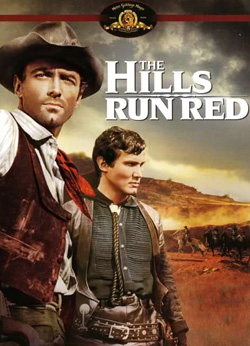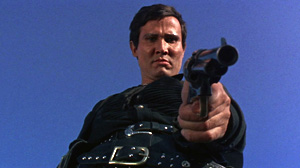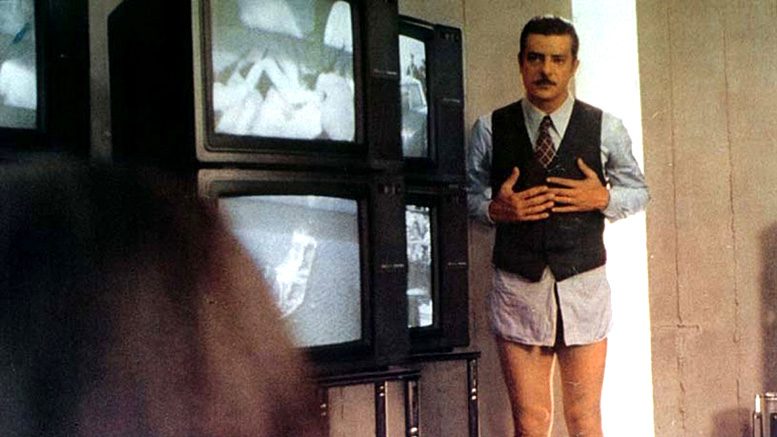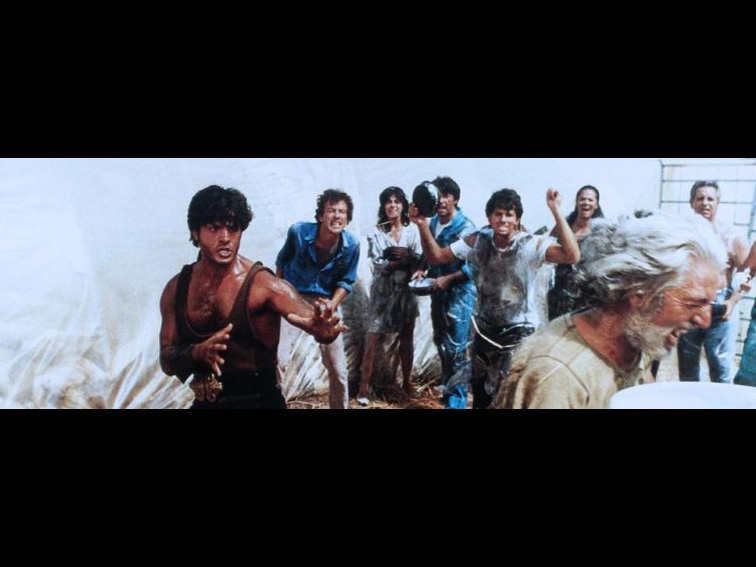
It is the end of the civil war. Jerry Brewster (Thomas Hunter) and Ken Seagull (Nando Gazzolo) steal $100,000 from the Yankees. Unfortunately, their getaway plan goes badly wrong, and Jerry agrees to act as a decoy so that his friend can escape with the cash. All he asks in return is that his wife is given his share of the loot.
Five (obviously tortuous, judging from the montage of pained expressions we’re treated to whilst the credits roll) years later, Jerry is released from jail. He is, however, being watched. It turns out that Seagull has become a moneyed landowner, whose wealth has increased even further due to his underhand expansionist techniques (such as rustling cattle from his rival ranchers). The last thing he needs now is for his old chum to turn up and demand cash, not to mention the fact that he knows just how pissed Jerry’s going to be when he discovers that his wife had died four years previously in a state of destitution. He orders his sidekick, Mendez (Henry Silva), to have some men dispatch him.
Fortunately, and with the help of a saddle-tramp called Getz (Dan Duryea), Jerry manages to make short work of his assailants. Getz also agrees to infiltrate Seagull’s gang. Knowing that he’ll need some kind of proof if he’s to claim that he’s killed Jerry, he cuts off a tattoo from the ex-con’s forearm, folds it daintily between two leaves and presents it to the rancher – who is suitably impressed with his flower pressing skills and hires him. Meanwhile, Jerry is behaving with an astounding level of subtlety and manages to get into a big fight (which includes that old ‘frying pan as weapon’ staple) with Seagull’s men. Despite himself, Mendez is impressed by the man’s courage (‘you’re a champion, and you don’t kill champions – you race them!’) and takes him under his wing. Of course, Jerry has his own plans, and immediately sets about helping the townsfolk reclaim what’s rightfully theirs as well as planning his vengeance…
The Hills Run Red is a rather mediocre production, which is especially disappointing considering that it comes from such an estimable team. Ennio Morricone, who contributes a good soundtrack (with the exception of a truly execrable saloon bar song), needs no introduction and talented filmmaker Carlo Lizzani would go on to score great successes with crime films like Wake Up and Kill (66), Bandits of Milan (68) and Crazy Joe (73). His other spaghetti western, Requiescant(67) is considerably weirder but also rather more effective. What they all do share is a certain overwrought quality; there’s none of the laconic ‘coolness’ so prevalent within the genre here. Instead the hero isn’t reluctant to break into a surge of primal screaming, smash up furniture in fit of pique or come out with lines such as ‘I wanna see you spit out your soul!’

Indeed, this is the fundamental problem with the film: that Jerry Brewster is a rather annoying character on the whole. Whereas most spaghetti heroes just get on with the job and look good, this guy has to continually talk about it as well, which just isn’t on. This is further hindered by the fact that Thomas Hunter isn’t the most accomplished of actors, and yet is called upon to emote with a disheartening frequency. Additionally saddled with one of the worst dubbing jobs ever, this often creates a hilarious outcome. Indeed, this is one of the few Italian films in which the American stars can be accused of overacting more than their European colleagues. Henry Silva turns in a performance that is, well, unique. Now I could watch Silva butter a slice of toast, frankly, so this is just dandy with me. Looking smoochie in a black leather outfit and cackling deliriously, he comes across as a cooler version of River Pheonix in Gladiator. He also has a death scene that is so over the top that it could almost be worthy of Klaus Kinski.
Apart from these, however, most of the other characters are woefully underdeveloped. The gorgeous Nicoletta Machiavelli has a thankless role as Seagull’s daughter, Geoffrey Coppleston pops up as a saloon owner and Dan Duryea proves that he’s more boring than an academic dissection of 20th Century carpet designs. Worst of all, Loris Loddi, the ‘orrible tyke from Maciste in King Solomon’s Mines, turns up and makes bizarre Masonic hand-signals at everyone for 45 minutes.
Regnoli’s script has potential, and some great baroque dialogue, but could really have done with something truly original to mark it out from the herd. There are some memorably nasty moments, most notably the aforementioned tattoo removal and a tasty knife through the hand sequence. However, the hokey ending is unforgivable. There is some indication that this was tacked on as an afterthought, which is all too believable.


I agree with your assessment Matt. The overacting by the key players is annoying. I don’t know who to blame; the director or the actors. The score by Morricone is fine but sounds like it belongs in a Wilderness Family film. Again was Lizzani trying to make a children’s movie, a remake of Shane or was he just not impressed with the material and allowed Hunter and Silva go over the top. Not a bad film but a rather unique experience.